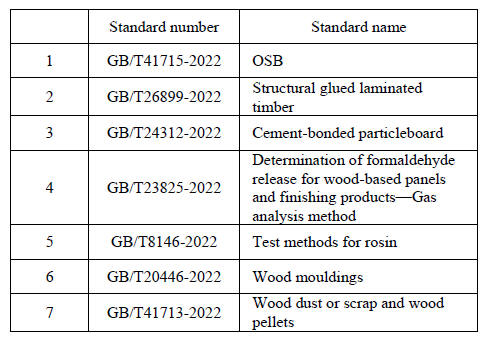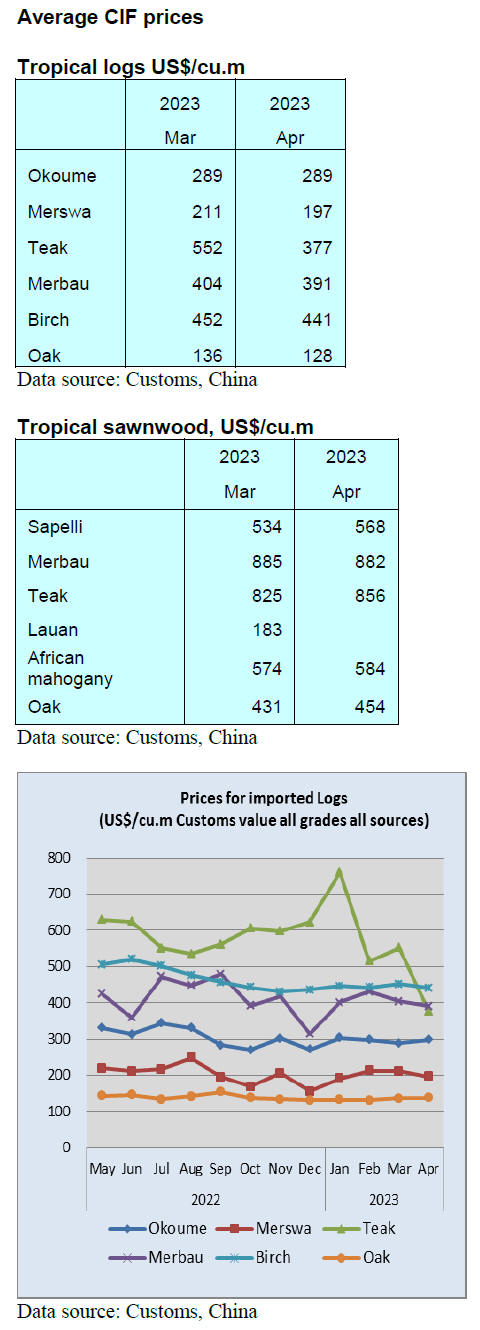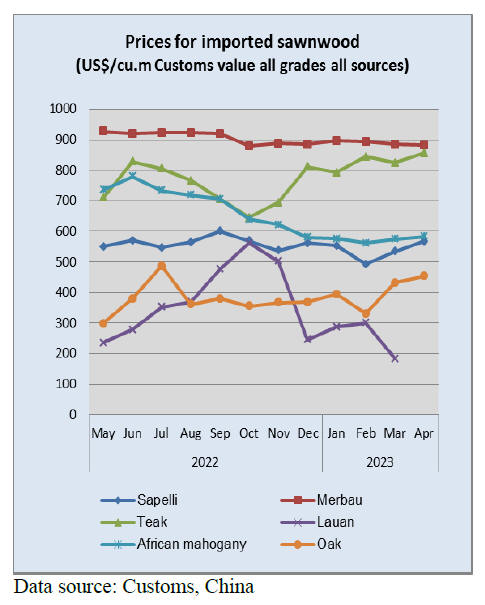US Dollar Exchange Rates of
10th
Jun
2023
China Yuan 6.93
Report from China
Anti-dumping
and countervailing duties to remain
As a result of the determinations by the US
Department of Commerce and the US International Trade Commission in their
five-year sunset reviews that revocation of the anti-dumping duty and
countervailing duty orders on certain hardwood plywood products from China
would likely lead to the continuation or recurrence of dumping and subsidies
creating material injury to industries in the United States.
As a result of the ITC's decision existing tariffs on imports of hardwood
plywood from China will remain in effect. The move falls under the five-year
(sunset) review process required in the Uruguay Round Agreements Act. U.S.
Customs and Border Protection will continue to collect AD and CVD cash
deposits at the rates in effect at the time of entry for all imports of
subject merchandise.
The effective date of the continuation of the Orders was May 25, 2023.
Pursuant to section 751(c)(2) of the Act and 19 CFR 351.218(c)(2) Commerce
intends to initiate the next five-year reviews of the Orders not later than
30 days prior to the fifth anniversary of the effective date of
continuation.
See:
https://www.federalregister.gov/documents/2023/06/06/2023-12028/certain-hardwood-plywood-products-from-the-peoples-republic-of-china-continuation-of-the-anti-dumping
The current tariffs on plywood from China, many of which exceed 200%, will
remain in place for at least another five years.
US to impose a tax on plywood from Vietnam containing Chinese core
panels
According to the Trade Remedy Bureau of the Ministry of Industry
and Trade of Vietnam, the US Department of Commerce (DOC) continues to
extend the time for the final conclusion of the anti-tax evasion and
anti-dumping investigation on plywood using hardwood material imported from
Vietnam.
The US Department of Commerce will issue its final conclusions on July 14,
2023. This is the eighth time the Commerce Department has delayed issuing
its final conclusion.
Previously, the US Department of Commerce announced the preliminary
conclusion of the case in July 2022, saying that if the wood panel inside
the Vietnamese hardwood plywood was imported from China it will impose
anti-dumping and countervailing duties on the plywood.
According to the Trade Remedy Administration of Vietnam the temporary tax
rate could be as high as 378.26%. However, the US Commerce Department
allowed Vietnamese companies cooperating with the investigation to
self-certify that they do not use Chinese materials to avoid being subject
to the measures.
Statistics show that the exports of enterprises participating in
self-certification accounted for about 80% of Vietnam's exports during the
survey period.
Resumption of imports of Australian timber
It has been reported that China has resumed imports of Australian
timber. Australia's timber trade with China was halted in late 2020 after
China said it had found pests in timber coming from several Australian
ports.
Data show that in 2022 Australia's timber exports to China were worth
RMB42.32 million compared with RMB4.13 billion in 2019 before the ban was
implemented.
In an effort to get back into the Chinese market Australian officials
petitioned China to resume trade and presented evidence of pesticide
spraying on logs to Chinese Customs authorities. But China did not respond.
The ban showed no sign of easing until 2023.
In March 2023 Chinese Customs sent Australian agriculture officials a list
of technical rules that must be met to resume timber imports.In May the
Australian Trade Minister, Stephen Farrel, arrived in Beijing for a
three-day visit. During the talks the two sides agreed to restart economic
and trade dialogue mechanisms such as the Joint Committee on Free Trade
Agreement and the High-level Trade Remedy Dialogue. In May China announced
the resumption of timber imports from Australia.
Encouraging water-saving in wood products enterprises
China is working on a national standard for water-saving in wood
processing enterprises. The preparation group for "Water-saving Enterprises
in Wood Processing and Its Products Industry" was established and the first
working meeting was held recently.
The project implementation period is from March 2023 to September 2024. A
draft of standard has been completed, the work plan has been formulated and
the implementation period has been clarified. After the meeting industry
trials will be carried out and the participating units will be recruited to
further improve the technical content of the standard.
The national standard "Water-saving Enterprises in Wood Processing and Its
Products Industry" provides the terms and definitions, evaluation index
system and requirements of the evaluation of water-saving enterprises in the
wood processing and products industry and the standard is applicable to the
evaluation of water-saving enterprises in the wood processing and products
industry.
The list of products includes wood processing (sawnwood, veneer, wood chips,
wood-based panel manufacturing (plywood, fiberboard, particleboard, veneer,
etc.), wood products (wood doors and windows, wooden stairs, wooden floors,
wooden containers, wood building materials and cork products).
National standards on wood products officially
implemented
Seven national standards on wood products have been formally
implemented since May 1, 2023. All release dates for 7 national standards is
on 12 October 2022. These standards are as below.

Wooden door enterprises turn to whole-house
customisation
Jiangshan City in Guangdong Province is the distribution centre for
China’s wooden doors and is known as the home of custom made wood products,
a quality and safety demonstration zone and an intelligent manufacturing
pilot demonstration facility.
At present, Jiangshan City has more than 1,000 door enterprises (whole house
customisation) and supporting enterprises of which 125 enterprises create
more than RMB20 million annual income, 17 enterprises above RMB100 million,
18 national level high-tech enterprises, several large scale door
enterprises (whole house customisation) creating more than RMB10 billion
annual income.
In recent years, due to the impact of the pandemic and the economic downturn
in the real estate market the wooden door industry across the country has
suffered. Jiangshan City has taken the initiative to promote 'a door' to 'a
room' and 'a suite'.
GTI Index Report (May 2023)
Weak international demand led to a decline in prices for some raw
materials. In May 2023, under the influence of shrinking domestic and
international demand, the upward Global Timber Index GTI- China Index trend
in the number of orders for GTI-China enterprises, which had lasted for
three months, reversed.
In May the GTI-China enterprises experienced a slight decrease in orders
compared to the previous month and there was an increase in inventories of
main raw materials and finished products while the purchase prices of raw
materials has continued to decline for 3 consecutive months.
The GTI-China enterprises reported challenges such as a long waiting period
for raw material deliveries and unstable sources of supply. In May the
GTI-China index recorded 35.3%, a decrease compared to that of the previous
month and it was the first time in the past three months that the GTI-China
index fell below the critical value (50%), indicating that the business
prosperity of the timber enterprises represented by the GTI-China index had
shrunk from April.
GGSC enterprises in China reported the following for May:
Products in Short Supply: Mahogany, Oak, High-Grade
European Oak.
Commodities with Price Increase in this Period: Solid
Wood, Engineered Wood, Particle Board, Melamine Impregnated Paper, Paraffin,
Formaldehyde-Free Adhesive, Waterproofing Agent, Adhesives, Leather.
Commodities with Price Decrease in this Period: South
American Timber, European Timber, Russian Timber, Poplar, Base Materials of
Joinery Board, Flooring Blank, Mixed Wood, Fir Wood Lath, Urea, Melamine,
Methanol, Formaldehyde, Metals, Paint, Paper Board, Glue, Kraft Paper.
Main Challenges Reported by GTI-China
Enterprises: Long procurement period, unstable sources of supply
and scarcity of oak materials.
See:
https://www.itto-ggsc.org/static/upload/file/20230615/1686792092163403.pdf


|